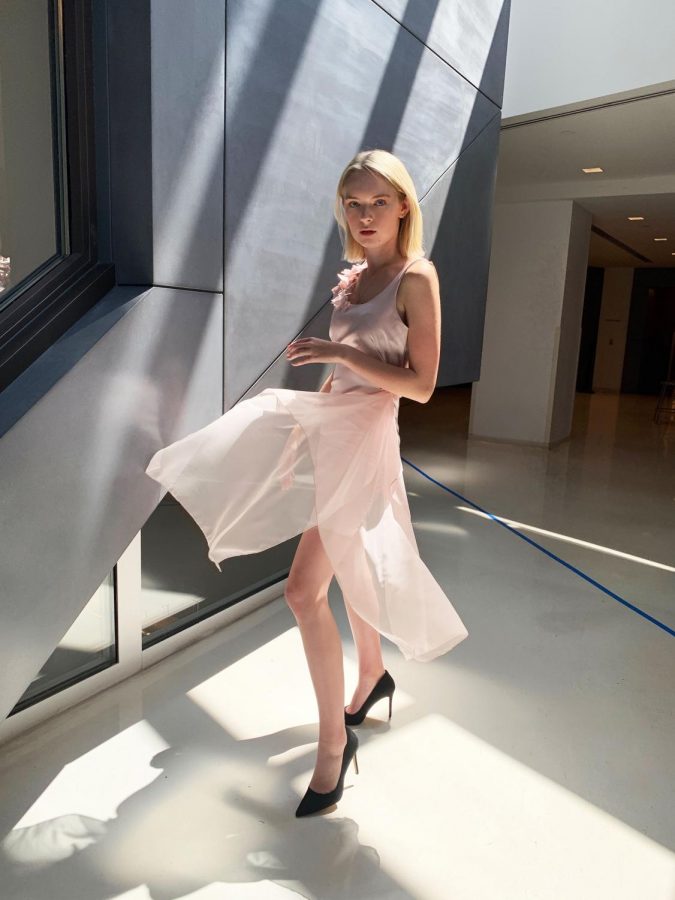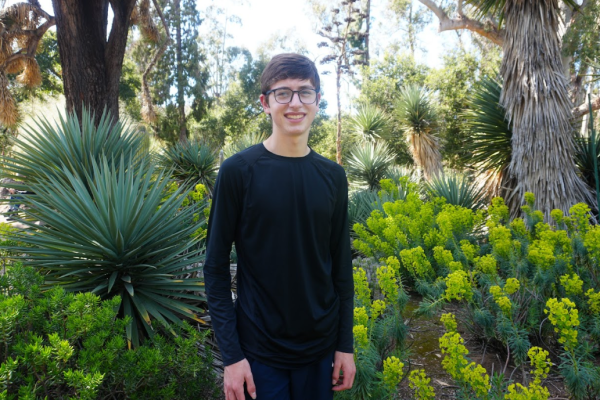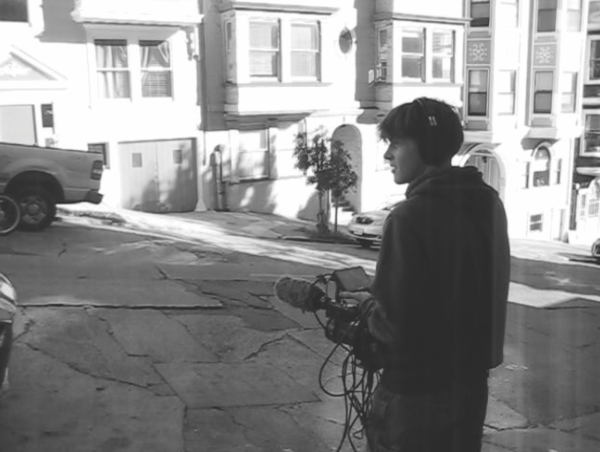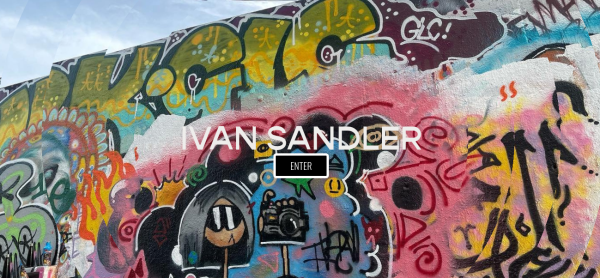Featured Artist: Amanda McVey
Taking on the fashion industry from sketchbook to runway.
Sitting in her room, a bright blonde haired little girl maneuvers a heavy pair of fabric scissors as she cuts away at her shirts, skirts and dresses scattered across the floor. In the eyes of her shocked parents, seven-year-old Amanda McVey was hacking away at her clothes, but in the young girl’s eyes she was creating a chic, runway ensemble.
Senior McVey is a double threat in the fashion industry as both a designer and model. Currently, she is preparing herself for college and a future in fashion, which has led her to spend a great deal of time reflecting on her past and the original roots that sparked these artistic passions of hers.
“I’ve always been a pretty creative person, and I always liked dressing myself up and accessorizing,” McVey said.
Her design ideas did not come to life until she learned how to sew in fourth grade. Soon after that, McVey’s interest in modeling flourished, and so did her serious intent within fashion design.
“I was always a bit taller so my mom thought, ‘Oh, I think [modeling] is something you would like, you could probably do it and you love fashion so I think you’d like it,’ so I started to dabble in [modeling],” McVey said.
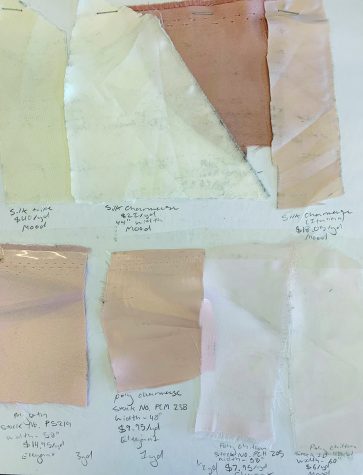
As with most of her projects, McVey does an equal balance of modeling and fashion designing; when she creates a design, she models it herself.
One of her favorites is a pink cocktail dress, made during a three week summer intensive course at Parsons School of Design during the summer of 2019. Despite the pressure to come up with a wearable design in under three weeks, McVey found inspiration in a simple quote and got to work immediately.
“My inspiration came from this quote I stumbled across, ‘glorious femininity,’ and I really wanted to embody that,” McVey said. “I felt that orchids really played into that theme and I was obsessed with this light shade of pink at the time so it all came together.”
After sparking inspiration and sketching a couple basic designs, McVey’s process entailed pinning a mock-up of her design with a plain cotton fabric called muslin to understand the draping of the pattern, before committing to her final fabric. Next, she made a pattern by tracing the rough muslin pieces to pattern paper, a type of paper that is used to trace and prepare the shapes of the design before the final product is constructed. Finally, she used the pattern to cut her final fabric, the beautiful, silky pink that embodied McVey’s “glorious femininity” inspiration.
McVey’s Parsons experience has been momentous and life-changing in her pursuit of fashion design. This summer intensive pushed her to not only come up with innovative designs on paper, but also breathe them to life in the company of other aspiring designers.
“[This piece] really helped respark my drive when it came to actually doing physical pieces,” McVey said.
Through her experiences in the fashion industry, McVey has learned, changed, and grown both as an artist, and a person.
“One of the main things I noticed about my work over the years is that it has gotten more conceptual and less idea based,” McVey said. “That has a lot to do with the different art programs I’ve gone into, and how my art teachers have pushed me.”
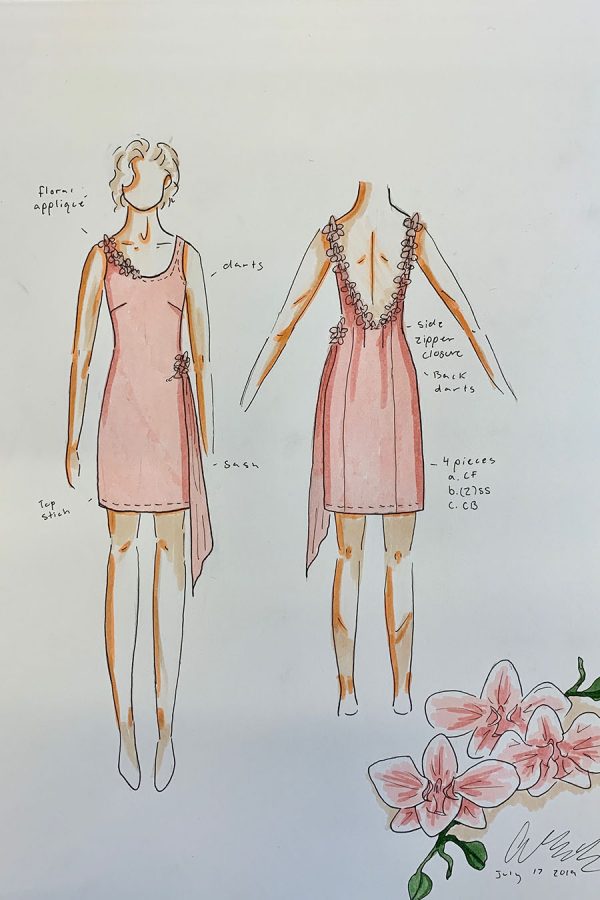
Fashion design is not an easy process, and the possibilities for problems and errors along the way are endless. But, McVey has learned important life lessons through the challenges she faces.
“If one thing is off at the beginning, like your pattern is not quite right or the fabric lays funny when you’re working, if you don’t fix it right then and there, it’s going to cause a series of problems all the way down the line,” McVey said. “That’s an important life lesson too, that when you have an issue in the present, deal with it the best you can instead of letting it accumulate and worsen over time.”
In fact, one of the challenges she faced while creating her pink cocktail dress was near the beginning of the sewing process. The zipper hadn’t been sewn in well and the under-arms of the dress did not look the way she wanted.
“I was able to fix these later, but that’s an example of why you want to take your time and care when creating clothing,” she said.
McVey’s advice to someone pursuing fashion design is to be curious and inquisitive to the world around us, because inspiration can be found anywhere.
“Keep a sketchbook and just put anything down because anything can inspire a fashion design… whether it’s an idea, shape, color, or motif,” McVey said.
Right now, McVey is working as a model and individually creating her own fashion designs. She is represented as a model by two agencies: a mother agency in New York that focuses on developing and improving her skills and an agency in San Francisco that finds her clients to work for. She also works at Paly Theatre as a costume designer, where she manages underclassmen, creates mood boards for the shows and helps bring the performances to life through the costumes she puts together.
McVey intends to pursue fashion in the future, in college and as a career. Fashion is a huge part of her life and a way to express herself creatively.
“A lot of the time people who aren’t in the fashion industry look at fashion as frivolous, or just aesthetic,” she said. “I think fashion is a form of art that is really important, with understanding how it relates to self expression.”
• Photos courtesy of Amanda McVey

2020-2021 - Staff Writer
2021-2022 - Managing Editor
I joined CMag because I was interested in writing about arts, music, and culture and...

I joined C Mag newly this year because I thought it would be an interesting opportunity to take advantage of. We’re so lucky to have such a...


